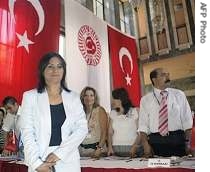2007年VOA标准英语-Turkish Ruling Party Makes Inroads in Secular R(在线收听)
Diyarbakir
06 August 2007
In Turkey's general election last month, the Islamic rooted Justice and Development party secured over half the votes in the predominantly Kurdish region in the southeast. That success is being seen by some political analysts as an indication of an increase in Islamic sentiments among the mostly secular Turkish Kurds. From Diyarbakir, Dorian Jones filed this background report for VOA.

Independent candidate Aysel Tugluk stands before completing registration formalities at the Turkish parliament in Ankara, 29 Jul 2007
Last year, there were demonstrations throughout the Islamic world, after a Danish newspaper published cartoons that depicted the prophet Mohammed. While there were similar protests across Turkey, one of the largest demonstrations drew a crowd of about 100,000 people here in Diyarbakir.
According to political observers the size of the protest was surprising because of the city's strongly secular reputation.
One of the organizers of the protest was Serdar Yilmaz. He heads an Islamic human rights group Ozgur Der, and says he believes the demonstration is an indication of a move toward Islam among the Kurds.
He says "There is a growing anger towards the West, especially with Israel and the U.S. and what's happening in the Middle East. It's fueling the rise in religion, which is becoming stronger in response to a societal need to fill a gap here. This gap has been created by the backwardness of our society and the mass migration into the cities caused by decades of fighting between the state and Kurdish separatists, that has resulted in a moral degeneration. There are now two powerful forces here: secular Kurdish nationalism which supports the west; and religion."
When the Islamic rooted Justice and Development party won more than half the votes last month in the predominantly Kurdish southeast, the party faithful celebrated their surprise victory. The result pushed the Kurdish nationalists into second place. The success of the Islamists, according to political observers, was in part due to the support of the region's powerful ancient Islamic sects or Tariqats (Sufi Orders).
At an evening religious class, Mohamed Akar reads the writing of a Muslim prophet. Across the city, Islamic sects or Tariqats like this one, hold meetings every night. The all male audience of young and old, rich and poor, listen attentively.
The Tariqats go back centuries and are widely seen as an intrinsic part of Kurdish cultural life. In the last few years they too have been expanding their influence by building schools offering free education and housing the poor. Speaking with Akar after the class, he says these groups are hoping to build bridges with the West.
"Unlike Hezbollah and other extremists, the main religious sects have entered a positive phase," he said. "They have learned more about democracy and how to voice their concerns using democratic tools. Especially with the democratic reforms introduced [in Turkey] under pressure from the European Union, it has created a space of freedom. But if the E.U. process ends, and U.S. abandons Kurds living in Iraq, then everything can change. There can be a chaos and you could see a radicalization of Muslims."
An old teashop buried in the historical quarter of the city sheds some light on how the locals feel about the West. Every night various Islamic intellectuals come here to discuss religion and politics.
As usual, at this gathering the topic is the West. Strong arguments can be heard on both sides.
Some speak of the positive effects of the European Union in improving human rights for Kurds, along with the argument that American soldiers are protecting their Kurdish brothers in Iraq.
Others point to Turkey's faltering bid to join the E.U. since the 1960s, noting it has made little headway amid rising grassroots opposition within Europe.
In the end, there appears to be little consensus between the two sides, except that the West's policies will continue to be a major factor. This man, who wanted to remain anonymous, says what is needed is more understanding.
"If the radical movements increase, that will be because of mis-policies of the West. The West should try to understand the East and the East should try to understand the West," he said.
In the end, how Islam manifests itself here as a moderate or radical force, will be influenced by the policies of Europe and the United States. At the same time, what is happening in the region will also likely have an impact on U.S. and European policies. But whatever direction Islam takes in the region could have far reaching consequences in a strategically important region which neighbors Iran, Iraq and Syria.